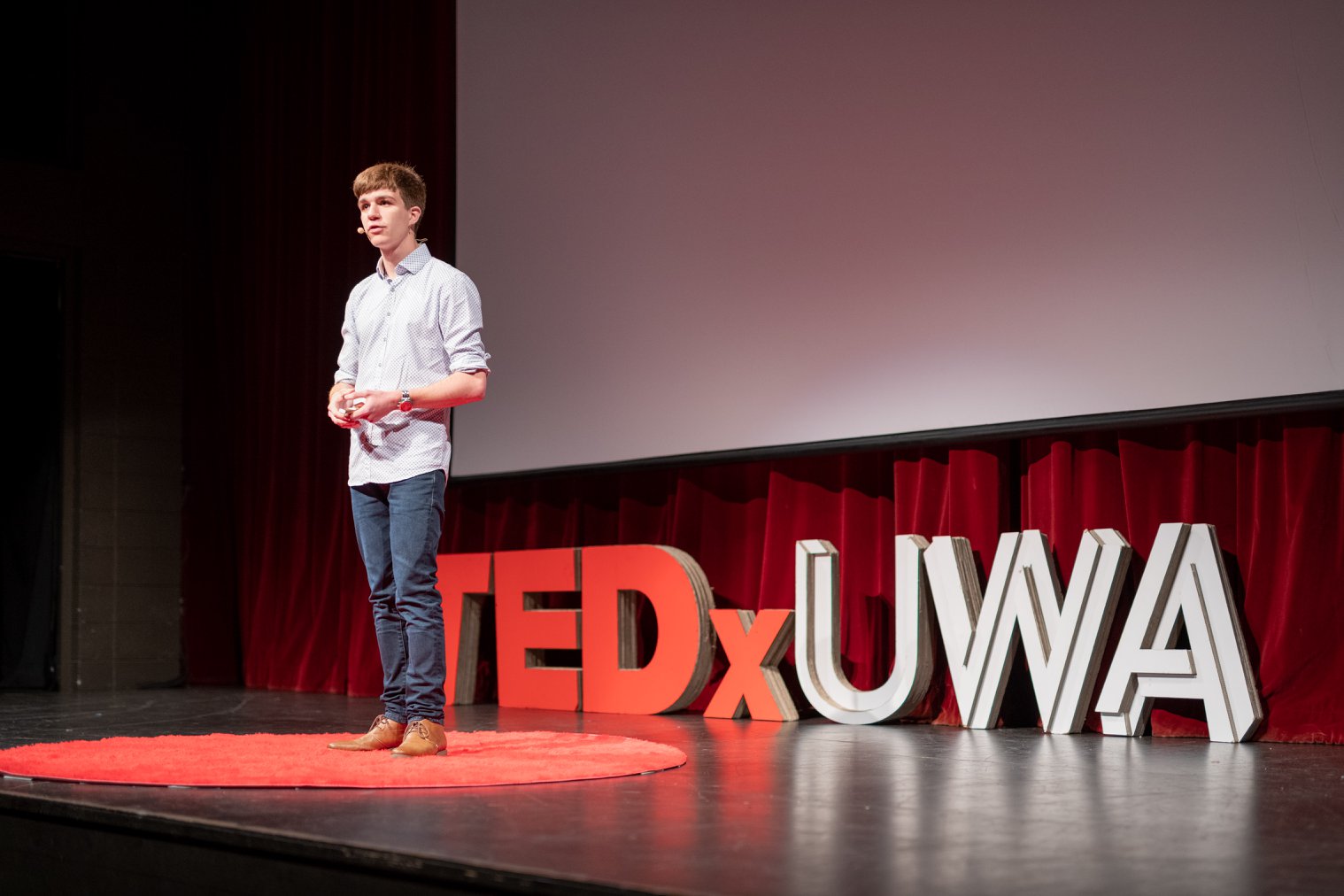The Investment Dialogue for Australia’s Children
In a landmark event held in Canberra on December 4, 2023, the Investment Dialogue represented a transformative moment in Australia’s philanthropic landscape. This national initiative, dedicated to enhancing the well-being of children, young people, and their families, brought together leaders from philanthropy and the government to forge collaborative pathways toward a brighter future.
A highlight of the Investment Dialogue was the signing of a Working Together Agreement by the Treasurer, the Hon Jim Chalmers MP, and the Minister for Social Services, the Hon Amanda Rishworth MP. This groundbreaking agreement, endorsed by 20 philanthropic organisations, including the Fogarty Foundation, represents a commitment to joint efforts in enhancing the lives of Australia’s youth. It sets the stage for a decade-long dedication to collaborative and philanthropic initiatives, signifying a sustained effort to bring about enduring positive change.
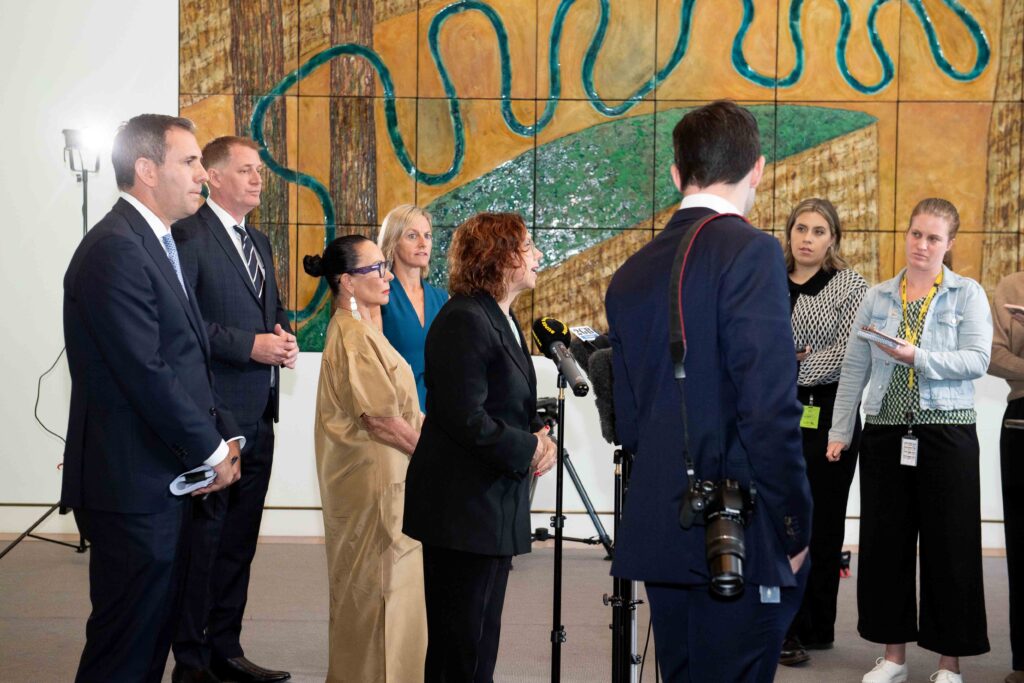
‘We owe it to all Australians, and particularly Australia’s children, to tackle entrenched disadvantage in our communities. The Investment Dialogue for Australia’s Children will help in achieving our goal.’ the Hon Amanda Rishworth MP, 2023
The Investment Dialogue will include the establishment of Community and First Nations Leadership Councils, a core outcome that promises to support the Dialogue’s decision-making processes. Chaired respectively by Catherine Liddle and April Lawrie, these councils aim to ensure that the lived experiences of communities and First Nations peoples are integral to the Dialogue’s proceedings. An open Expression of Interest process for council members will occur in early 2024, fostering inclusivity and diversity in leadership.
Four strategic Working Groups have emerged from the Investment Dialogue, each with a specific focus on driving positive change:
- Data Working Group (established in early 2024): Prioritising improvements in data practices, including community access to data, this group aims to identify areas for reform, facilitate effective investment decisions, and support community decision-making.
- Place Working Group (established in early 2024): This community-led group focuses on delivering targeted, place-specific solutions and collaborates on ongoing initiatives across government and philanthropy.
- Integration and Investment Flows: This group aims to enhance coherence in local-level investments, supporting the design, funding, and delivery of integrated and holistic services and solutions.
- Evaluation and Learning: Committed to continuous improvement, this group collaborates on evaluating the impact of the Investment Dialogue, ensuring that insights are shared widely.
The Investment Dialogue for Australia’s Children stands as a testament to collaborative philanthropy, embarking on a transformative journey to improve the well-being of the nation’s youth. With a strong foundation laid by the Working Together Agreement, a ten-year commitment, and the establishment of the Leadership Councils and Working Groups, the Dialogue promises to be a catalyst for positive change. As it unfolds, this philanthropic endeavour is poised to shape the future for Australia’s children, fostering a society where collective efforts lead to enduring well-being and prosperity. The subsequent roundtables in 2024 are anticipated to build on these commitments, propelling the Investment Dialogue toward even greater heights of impact and innovation.
The Foundation is proud to be part of this important initiative.
THREE Western Australian teacherS RECOGNISED WITH A NATIONAL teaching excellence AWARD
There are multiple factors which make a school high performing, including the excellent teachers who continuously invest in their own progression and/or introduce worthwhile initiatives in order to be better educators.
A light was shone on three outstanding educators from Western Australia recently as part of being awarded a 2023 Commonwealth Bank Teaching Award. Congratulations to Nadine Stapleton of South Hedland Primary School, Jade Foster of Mount Tarcoola Primary School and Lauren Warschauer of Byford Secondary College.
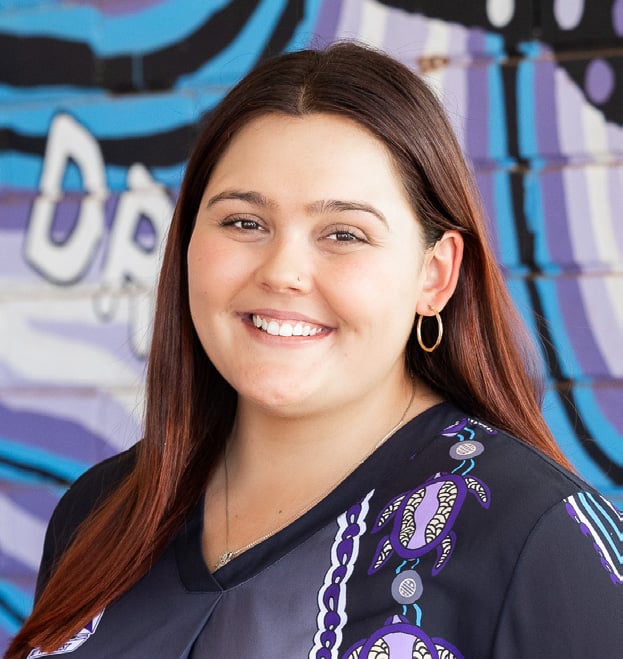
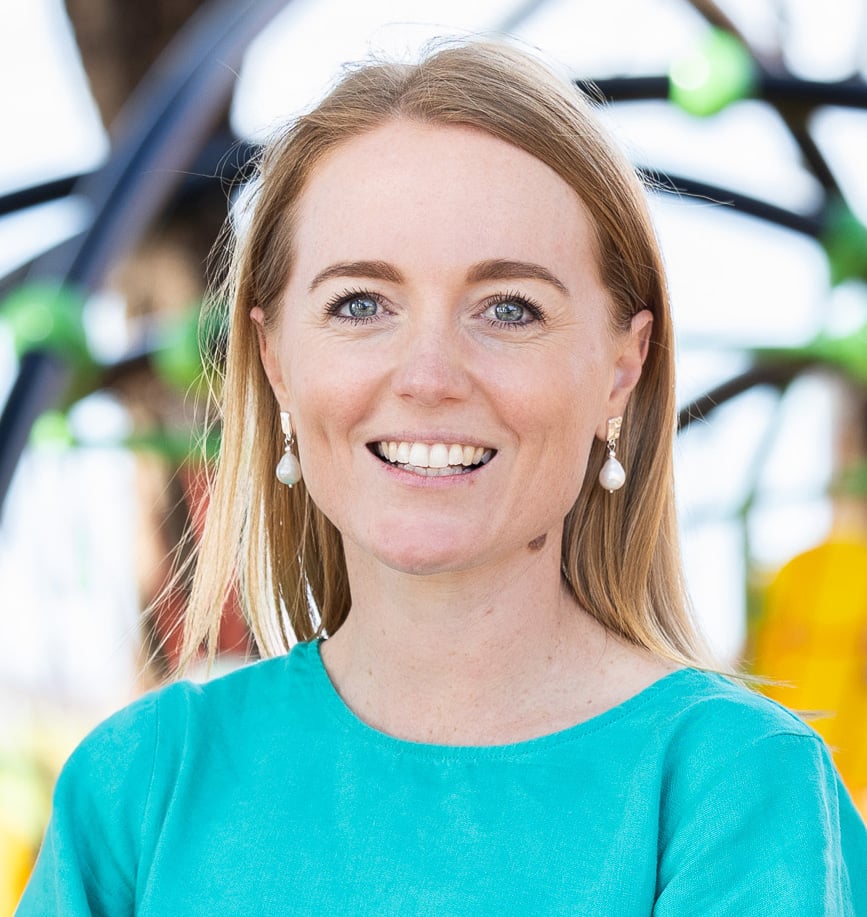
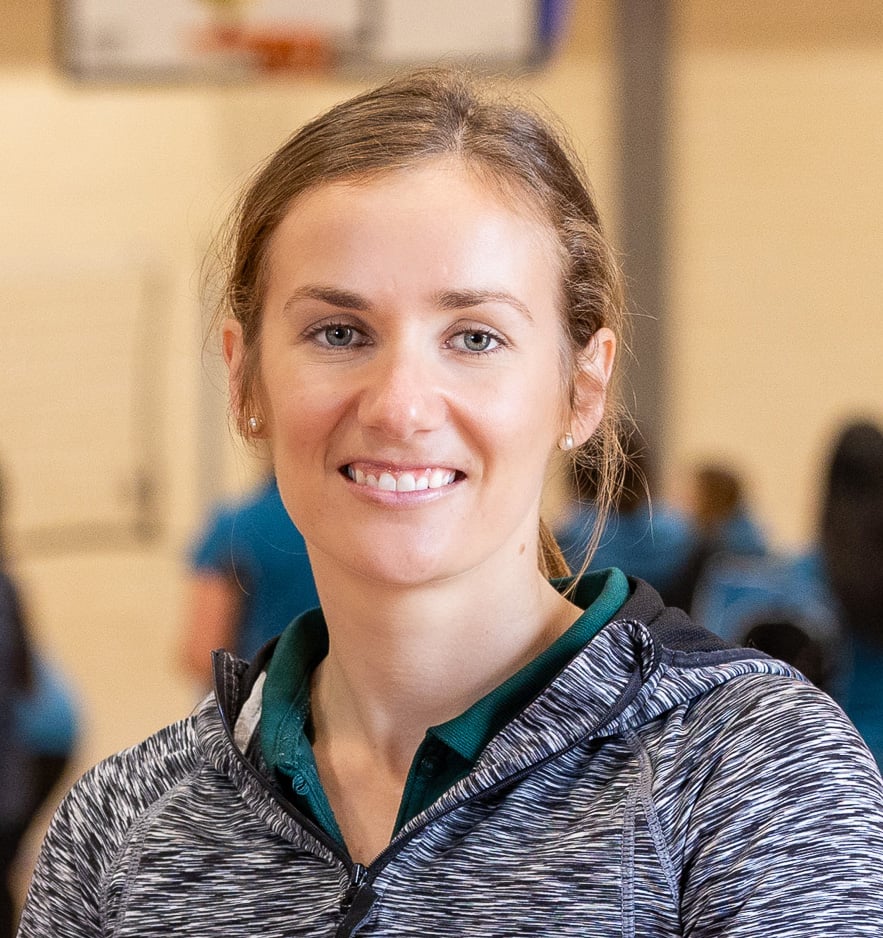
Nadine Stapleton, an Early Childhood Teacher in Western Australia, prioritizes communication at South Hedland Primary School. She works with a diverse student body, including 62% First Nations children, and has implemented initiatives like the Green and Red Choices program, using gestures and props to improve communication and behaviour. Nadine also fosters community relationships through events and KindiLink sessions, aiming to create a safe space for children and families and dispel negative perceptions about education.
Jade Foster, a primary school teacher and instructional coach at Mount Tarcoola Primary School, improved student outcomes by implementing evidence-based teaching strategies. Her efforts resulted in consistent high scores in English and Mathematics, and she also shared her knowledge with other teachers, mentored educators from the region, supervised student teachers, and hosted parent workshops to enhance early literacy and numeracy skills.
The third winner, Lauren Warschauer, is a health and PE teacher who has successfully implemented her Engage programme within her secondary school. The program has transformed the health and wellbeing of many of her students with her innovative approach to building their skills and understanding of ways to live a healthier life, as well as improving student engagement.
Engage is an 8-week program developed by Lauren, where students come to school early twice a week. In these early morning sessions, they participate in fitness activities, cooking classes and healthy meal preparation. Students also get the opportunity to hear from inspiring guest speakers from their community and beyond. Participants are given opportunities to volunteer in their community, as well as get involved in team building activities to develop their leadership and communication skills; skills which have been found to be key contributors to confidence and success.
‘Warschauer transformed the health and wellbeing of many of her students with her innovative approach…’
The Foundation is pleased to see that Lauren hails from a Fogarty EDvance school. The Fogarty EDvance School Improvement Program provides high quality support to build leadership capability and increase the overall effectiveness of schools, through a unique three-year professional development opportunity, which brings together the best practices, resources and tools from education, business and philanthropy.
Commonwealth Bank partnered with Schools Plus to sponsor the Awards celebrating transformational learning. Applicants are required to have significantly contributed to a measurable improvement in student learning within their institution, using high impact, effective and evidence-based leadership practices. Schools Plus has been working to close the gap caused by educational disadvantage in Australia. Its mission is to facilitate sustainable change to help children facing difficult circumstances. Through Awards such as these, excellent educators are championed and offer inspiration to others involved in the sector.
One hundred and fifteen West Australian teachers and 100 students have cut their holidays short, returning to school for the fifth annual Fogarty EDvance Teaching Intensives.
Initiated by the Fogarty Foundation in 2018, the intensives are run in partnership with Dr Lorraine Hammond, Associate Professor at Edith Cowan University, and hosted at Dawson Park Primary School. Each year the intensives have grown, supporting more than 365 teachers to implement high-impact instruction practices.
The intensive week of professional learning provides early childhood, primary and secondary teachers with the opportunity to observe expert teachers, practise key skills, and obtain feedback and coaching as they finesse their high-impact instructional strategies. Steered by Dr Hammond, the program was created following evidence-based research into how to effectively support teachers to adopt new practices.
“Research confirms that ‘one shot’ professional learning does not work. Instead, educators can transfer new skills to their teaching practice when they have access to theory, quality teaching demonstrations and have the opportunity to practice instructional strategies with ongoing support, guidance, feedback and coaching,” Dr Hammond explained.
“We are creating a community of teachers who have developed high-impact instructional strategies they can share with their peers and implement in their schools. By sharing best practice and collaborating with their peers, our teachers will create a ripple effect that will improve the quality of teaching in Western Australia,” she said.
High-impact instructional strategies integrate lesson delivery and design where content is explicitly taught with frequent checks for understanding. Lesson delivery relates to how content is presented (i.e., read with me) and includes continual checks for understanding by indiscriminately selecting students to take part in discussions. Lesson design refers to how new content is organised, presented and modelled (i.e., Guided Practice followed by Independent Practice). This includes daily reviews of previously learned knowledge and skills to reduce cognitive load and build automaticity.
High-impact instructional strategies have been used by teachers at Dawson Park Primary School since 2014. The school has seen significant improvements in NAPLAN scores since the inception of these teaching strategies.
“Our dedicated and professional team use high-impact instructional strategies in all areas of the curriculum. There is low variability in instruction, expectations are clearly communicated and as a result, our students come to school feeling comfortable and confident in their abilities – they know what to expect,” Pauline Johnson, Principal at Dawson Park Primary School explained.
“We’ve seen significant improvements in student results. Our students perform well above the average when compared to similar schools and they have a positive attitude towards their learning,” she said.
Georgie Wynne, Program Director at Fogarty EDvance reiterated the importance of innovative professional learning for educators and schools.
“It is vital for teachers to be knowledgeable about evidence-based pedagogical research so they can develop an innovative ‘toolkit’ for successful and impactful teaching,” Ms Wynne explained.
“Fogarty EDvance aims to inspire excellence and high-quality instruction in schools by investing in teachers, school leaders and school principals to ensure that all students receive a high-quality education, regardless of their background.”
The quality of student learning is inherently dependant on the quality of the school curriculum. The proposed new Australian National School Curriculum has met with a lot of discussion and feedback. In our opinion, the proposed curriculum does not prioritise evidence-based learning, nor does it set aspirational yet achievable standards. The introduction of key concepts, particularly in mathematics, fall far short of many other OECD countries.
We, along with hundreds of others, have submitted feedback to ACARA. You can read our submission below, with links from other regarded educationalists.
The Fogarty Foundation’s submission to ACARA regarding the proposed new Australian Curriculum
The Fogarty Foundation is a social purpose organisation, providing educational opportunities in Western Australia. I write to you with our 21 years of experience in education and particularly, through our 10 years of delivering Fogarty EDvance, a three-year school improvement program for school leaders in challenging communities.
Through Fogarty EDvance, we are working with over 100 low socio-economic schools (both primary and secondary schools) throughout Western Australia. We know that there is a high proportion of students who have difficulties with literacy, predominantly in their ability to read. Thirty-five percent of students in Year 7 in these schools (this equates to approximately 17% of Year 7 students nationally) are reading at a Year 3 level and below, which means they are not independent readers or able to read with fluency. At this level, these students are not able to access information in their books or on their screens in their classes. They lack confidence and no longer identify as a ‘learner’ in their school. As a direct result, many students disengage with education and for some, finish 13 years of school, illiterate and innumerate.
Many of the schools with which we work as part of the Fogarty EDvance School Improvement Program, set out on a journey to make significant improvements in the educational outcomes of their students – starting with reading. These schools set out to use evidence-based teaching and learning approaches to the teaching of reading. This typically involves using high-impact instructional strategies (such as explicit instruction) across the school with a strong focus on effective reading instruction in the early years. Effective reading instruction requires students during the early years of school to master the alphabetic code via systematic, explicit, and intensive instruction in phonemic awareness, phonics, reading fluency, vocabulary, and reading comprehension strategies (Department of Education, Science and Training 2005, p.25).
The schools strategically plan to implement effective reading instruction as part of their school improvement work and in doing so, know that the evidence that supports this type of instruction is solid. However, many of their teachers do not have the necessary skillsets to be able to teach reading in this way. As a response to this, the Fogarty Foundation established a teaching intensive in 2019, for schools to send teachers (both new graduates and experienced teachers) to receive a week of intensive coaching and demonstrations in explicit instruction. This included a focus on effective reading instruction in the early years. The teaching intensive was carried out during school holidays, with students at the low socio economic primary school giving up a week of their holidays to take part in the intensive. Demand was so great that we ran two intensives the following year, three in 2021 and are planning four for 2022. Again, there is no shortage of school students and teachers who want to be part of this program. In total, 250 teachers have been trained through our EDvance Teaching Intensives (using 200 students, 15 expert teachers/coaches and 2 program leads, Dr Lorraine Hammond and Brooke Wardana).
The demand for these skills is great, but the supply is low: skills which are not being taught in most Initial Teaching Education university courses. A previous EDvance staff member has now established a business to help address this need.
Given our work with school leaders over the past ten years and more recently, our work with teachers, our strong submission is that only evidence-based teaching approaches should be included in the proposed curriculum. The inclusion of whole language in the revised Australian
Curriculum is out of step with research and is failing our children. We concur with the submission made to ACARA by Emeritus Professor Max Coltheart on behalf of the members of the Developmental Disorders of Language and Literacy (DDoLL) network dated 7 May 2021, including the attachment of the article written by Dr Jennifer Buckingham that was published in The Australian on April 30, 2021.
We draw your attention to our website and in particular, the Report Card for Cohort 4 which can be located here. What school leaders and teachers need to improve reading for their students is clear guidance from the Australian Curriculum on effective reading instruction. It is our strong belief that with evidence-based approaches to teaching and learning, all schools can improve academic (and ultimately, life) outcomes for their students.
You can read additional feedback at the following links:
Curriculum takes backward step on the path to literacy – Five From Five
Open letter to Mr. David de Carvalho, CEO of ACARA, and the ACARA Board
A recent article in the Australian Financial Review commended Sydney’s $120 billion tech cluster.
…this pocket of thriving tech activity has all the ingredients for creating a sustainable tech ecosystem, including the presence of well-funded venture capital firms, adjacency to three universities undertaking world-class research and a bunch of wealthy tech founders keen to invest in other start-ups.
Australian Financial Review
We know that an ecosystem – a cluster of businesses, intellect and support – is needed to get a sustainable industry up and growing.
Businesses are injecting capital and intellect, the NSW government is proactive in developing the new Tech Central with 200,000 square metres of space for tech start-ups and providing access to rent subsidies and this is being fed and supported by three universities that are all within bus or tram rides of the Surrey Hills hub.
The universities of Technology Sydney, NSW and Sydney all have a focus on the need to provide next generation skills and are active in supporting a start-up mindset with their students. UTS’s specialist start-up programs alone have 350 active start-ups.
The new Vice Chancellor at UNSW Attila Brungs who was previously at UTS, recently said that UNSW is looking at ‘meeting the skilling revolution Australian society needs’.
Not only is the Western Australian government not active enough in developing the clusters needed for innovative companies and industries to get traction and thrive, our universities do not have a clear strategy on developing the skills students will need for future-focussed jobs.
WA is still very much a resource focused state. But we are part of the global economy in a world that is rapidly changing and if we are to make the most of the opportunities that these changes offer, we need to build a knowledge economy: We need to become a smart and inspired state.
We need to build a knowledge economy: We need to become a smart and inspired state.
Annie Fogarty
Unfortunately our educational aspirations are deteriorating – WA has the lowest ATAR participation rate in the country – only 35% of our Year 12 students study for their ATAR, as opposed to the national average of around 65%.
It is important that there are various pathways to tertiary education to enable access to a diverse range of students, but low numbers of students taking ATAR subjects indicates low aspirations. A low ATAR focus within schools means that lower secondary curricula may not be sufficiently challenging and will limit post-secondary options for all students.
We need to be building a culture of excellence in education with high aspirations for all children. Business, government and the education sector need to come together to ensure our young people have the skills, the mindset and the incentives to develop a smart state utilising the great advantages that technology offers.
The Fogarty Foundation are proudly supporting The Smith Family, as they work to bridge the digital divide and allow more students to engage in digital learning opportunities.
Through the Fogarty Fund, The Smith Family have purchased 68 devices to support 64 students on the Learning for Life scholarship program. This is in response to the highlighted need of families to have access to digital technologies for school-aged children to complete educational tasks.
When asked how the laptop has benefited his life, Nate from the Learning for Life program said,
“Being able to complete my homework, not having to access [the] public library for information and not having to rely on my mum for lifts to get information elsewhere. This has given me independence. I would like to say thank you very much for my laptop, I am very grateful.”
Nate’s Mum also commented, “Thank you for helping my son, I appreciate it immensely. It’s really nice to see Nate doing his homework without any troubles. Thank you, thank you, thank you.”
The Fogarty Foundation has partnered with The Smith Family for 18 years, providing opportunities for gifted and talented students from disadvantaged backgrounds. The Fogarty Fund has supported families with finances associated with music camps, sporting equipment and fees and international learning opportunities.
The UWA Fogarty Scholars and Alumni had the wonderful opportunity to share a conversation with Iain Grandage, composer, conductor and Artistic Director of Perth Festival, at a recent Leadership Series event.
Iain is the first Perth-raised Artistic Director of the Festival in its 68-year history and spoke of how following his passion enabled him to work on the world stage.
Iain spoke with the Scholars about the arts, our community, Western Australia, Perth Festival, the celebration of stories, being connected, leadership and the importance of listening.
He shared his thoughts on leadership and whilst he had experienced many missteps throughout his career, he encouraged the students to always strive to enact positive change if (and when) they find themselves in a position to do so.
“Never presume you know. Always listen with open ears. That is where you will find the understanding and connection you need to move forward,” Iain said.
Iain is one of Australia’s most highly regarded collaborative artists, having won Helpmann Awards for his compositions for theatre, dance, opera, silent film and as a music director.
He has received Victorian Green Room Awards, the prestigious Sidney Myer Performance Arts Award for an individual and the APRA/AMC award for Vocal Work of the Year. He has curated the chamber music program for the Adelaide Festival and been the Artistic Director of the Port Fairy Spring Music Festival.
Iain has been composer-in-residence with the WA Symphony Orchestra and has an extensive track record of collaboration with Indigenous artists across the country. He explained to the Scholars that he had always been excited about the possibilities inherent in being Perth Festival’s Artistic Director because of the ability of the arts to change perceptions – of people, places and our history.
There is a new breed of ninjas in the north after Ashdale Secondary College launched CoderDojo North over the weekend. Thanks to Curtin University, Bankwest and the Autism Academy for Software Quality Assurance (AASQA), CoderDojo North is ready to motivate coding ninjas to be innovative creators of technology.
“It was great to see such a range of community partners coming together to start yet another Dojo in the community. The launch was attended by senior members across business, the AASQA academy and universities. Without this teamwork and band of volunteers, Dojos just wouldn’t exist!”
Simon Thuijs, Manager of CoderDojo WA
Coding is a tool that lets you write your story with technology. It is how humans talk to machines and an increasingly important skill for current and future generations.
“In Australia today, 87% of jobs demand digital skills, so it’s really important that we equip our youngsters with knowledge about coding and computers. Already, Ninjas at current AASQA Dojos are being linked up with paid internships and then ongoing roles, going to show that employers are really looking for candidates with these skills.”
Simon Thuijs, Manager of CoderDojo WA
CoderDojo North is dedicated to students with autism, working to build their strengths for future training and employment opportunities. At the Dojo (coding club), Ninjas (students aged 12-18) will work on code-related projects such as websites, apps, game development and more, with the support of volunteer Mentors from Edith Cowan University (ECU) and Curtin University
Lainey Bradley is Champion of CoderDojo North and mother to a child with Autism who has shone since he started coding.
“My son has been a part of CoderDojo WA since July 2017 and has exceled in his IT and coding skills. He knows what career path he would like to take and to have the support of Ashdale Secondary College, Professor Tan (AASQA) and Dr Cook (AASQA), I know that he will realise his dream job. At long last we, as parents, have hope for the future of our loved ones leaving school and going out into the community armed with the skills to be a success.”
Lainey Bradley, Champion of CoderDojo WA North
Attendees of this exciting launch included Hon Kerry Sanderson AC CVO (Ambassador for AASQA), Lyn Beazley AO (Ambassador for AASQA), Margaret Quirk MLA, Professor Arshad Omari (Vice-Chancellor ECU), Dr Tele Tan (AASQA director) and Dr David Cook (AASQA Advisory Board and ECU).
To find out more, contact Lainey.bradley@curtin.edu.au
Ten of the State’s highest achieving and most inspirational young people have accepted UWA Fogarty Scholarships, including this year’s Beazley Medallist, Josh Green (Christ Church Grammar School).
UWA Fogarty Scholarships offer the State’s brightest and most committed students a full scholarship for the entirety of their undergraduate and postgraduate degrees. Scholars are selected on their academic excellence and outstanding achievements in leadership, community involvement, enterprise, the arts and/or sport.
Winners of this year’s prestigious scholarships are Heather Bytheway (St Mary’s Anglican Girls’ School), Ella Dickie (Mount Lawley Senior High School), Josh Green (CCGS), Isabelle Hamer (Presbyterian Ladies’ College), Jason Lu (CCGS), Ella Miels (PLC), Joshua Peckover (Mandurah Baptist College), Ellen Smith (All Saints’ College), Emma Tinley (Bunbury Senior High School) and Sam Wake (Scotch College).
“I applied to be a UWA Fogarty Scholar because I saw it as a way to join a group of passionate, inspired and driven people,” said Jason Lu, 2021 UWA Fogarty Scholar.
“I want a career where I’m working towards positive change in the world and I saw the community of Fogarty Scholars as a group of like-minded people, actively driving these changes,” he said.
“I also saw the leadership development program as an opportunity to develop the skills that will allow me to achieve this ambition.”
In addition to financial support, the Scholars participate in a tailored leadership program, academic mentoring, leadership opportunities, support for their initiatives and are part of the Scholars and Alumni network.
“Current Scholars refer to each other as being more like family than colleagues, and this chance to build strong relationships and connections that will last for many years, is an incredibly attractive element of the program,” said Ella Dickie, 2021 UWA Fogarty Scholar.
“I’m looking forward to challenging myself in the company of many inspirational figures and to hopefully draw on their great knowledge and experience,” she said.
Annie Fogarty AM, Executive Chairperson of the Fogarty Foundation said, “We believe that through empowering young people with potential, they will provide vision and direction to enable positive change to benefit the community.”
“We need people to lead – in education and in life – which is why the UWA Fogarty Scholarships continue to be a key element of the Foundation,” Mrs Fogarty said.
Through the Leadership and Enterprise Program, the Foundation hopes to empower young people to be problem solvers and entrepreneurial creators. Many Scholars have started enterprises and not-for-profit organisations which the Foundation supports. They have now established the Scholars Enterprise Investment Fund to help the Scholar’s enterprises grow the next generation of businesses.
“The Enterprise Investment Fund will support the Scholars and build their networks, while enhancing WA-wide support for the next generation of enterprises, growing the number of jobs and diversity of businesses across WA and Australia,” Mrs Fogarty said.
Since 2004, the scholarships have educated and supported 166 outstanding young people. It is one of Australia’s premier scholarship programs. You can read about some of the exceptional Scholars at fogartyfoundation.org.au.
UWA Fogarty Scholar James Dingley has been awarded a Fulbright Scholarship to complete a Master’s degree in Space Systems Engineering. James will begin his two-year adventure in the US in August.
“I think Australia has massive capacity to do incredible things in space,” James said.
“The way the Fulbright Scholarship works is it covers the costs of my university, which is in America, so it’s a significant cost,” he said.
James was awarded a Fogarty Scholarship in 2017, and with a keen interest in the space industry, he undertook a Bachelor of Philosophy (Mechanical Engineering & Finance). As the 2018 recipient of the Jeremy Cheang award, James has travelled the world creating documentaries on key concepts in science and engineering; concepts he shares on his YouTube channel, Atomic Frontier Online.

James is also the Co-Founder and current Project Manager of UWA Aerospace; a team of university students who design, build and launch high powered rockets for research and competition. He has worked at NASA’s Johnson Space Centre and hopes to apply what he has learned from government and industry to contribute to the new Australian Space Agency.
You can read about James’ adventures in a recent article in the Western Suburbs Weekly – Perth Fulbright Scholar James Dingley off to US to study masters of space systems engineering.
